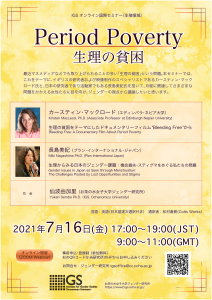IGS Seminar ‘Issues Regarding Commercial Sperm Banks from the Ethical, Gender and Social Perspectives’
| Date: | 16th July, 2021 (Fri) |
|
| Time: | 17:00~19:00(JST), 9:00~11:00(GMT) | |
| Online Seminar | (Zoom Webinar) | |
| Guest Speaker: | Kirsten MacLeod, Ph.D. (Associate Professor at Edinburgh Napier University) | |
| Miki Nagashima Ph.D. (Plan International Japan) | ||
| Moderator: | Yukari Semba (Project Lecturer, IGS) | |
| Language: | English and Japanese (with consecutive interpreting) | |
| Interpreter: | Naoki Matsumura (Colts Works) | |
| Registration: | Zoom Registration form |
|
Research presentation Abstract Kirsten MacLeod, Ph.D. Bleeding Free: A Documentary Film About Period Poverty In this presentation Kirsten will talk about the 2021 documentary film, Bleeding Free and some of the themes it presents in relation to period poverty. The film was produced by Kirsten and students at Edinburgh Napier University. Its central theme is the impact period poverty can have on the education and life chances of young women and girls. Charting the story of 3 Scottish students who are designing period product dispensers for their university, the film includes the development of the Scottish government’s policy of making period products available to all women and girls “who need them.” In Scotland the film looks at a range of approaches to raising awareness of period poverty– from a government policy level to students and schoolgirls campaigning within their institutions. It highlights the experiences of female footballers and how they cope with menstruation in high level sport, as well as the everyday experiences of women and girls. In Uganda the film offers an insight into different approaches to menstrual health education and support, from projects in schools teaching girls how to make re-usable sanitary pads, to community facilitators and elders who support women to set up businesses making and selling pads. A key message from the experiences of those challenging period poverty is that any initiatives must be embedded within communities and with the buy-in of that broader community, including men to have lasting success and impact. Miki Nagashima, Ph.D. Gender Issues in Japan as Seen through Menstruation: In this presentation, I will introduce the results of a survey conducted by Plan International Japan based on these survey results, and talk about some issues regarding menstruation. Plan International Japan conducted “Awareness Survey of young women in Japan toward menstruation” in March, 2021. We surveyed 2,000 women aged 15 to 24 years about menstruation and daily life related to menstruation. In the survey, we found that 3 out of 10 people had experienced not being able to buy or hesitating to buy sanitary napkins for the following reasons: “Low income,” “sanitary products are expensive,” “parents do not buy them,” and so forth. It was also found that the purchase of sanitary products and medicines such as low-dose pills and painkillers for menstruation has a lower priority than purchase of entertainment, transportation and beauty care. In addition, one in two suffered from menstrual cramps, and three in ten experienced losing some good opportunities due to being late or leaving early or even being absent from the school, club activities, or the workplace due to menstruation. Most of the subjects were taught treatment methods by their mother upon having the first period, and most of them answered that the person they would consult if needed was also the mother. Research in the United States shows that it is hard for young women to speak publicly about menstruation. The same thing might happen in Japan. |
|
Biographical notes Kirsten MacLeod is Associate Professor in Film & Television at Edinburgh Napier University, where she is Programme Leader for BA (Hons) Television. She has a background in Visual Anthropology, broadcast television and community media production. Her research interests include community, participatory and alternative media, social impact filmmaking, gender and local knowledge. She leads on the AHRC/GCRF funded project, Pacific Community Filmmaking and Gender, Impact and Public Engagement (2021-22) and is a Co-I on ESRC funded project, Investigating The Use Of Temporary Accommodation To House Asylum Seekers And Refugees During The COVID-19 Outbreak, employing digital methods and filmmaking outputs. She is the Executive Producer and Edit Producer of Bleeding Free (2021), a documentary on menstrual health education and access to period products, made with students and colleagues at Edinburgh Napier University. Miki Nagashima is an advocacy group leader of Plan International Japan. She received her Ph.D in Political Sciences from Graduate School of Political Science, Waseda University. She researched refugee policies in developed countries at the graduate school. While she conducted research on cases of women applying for refugee status because they wanted to escape FGM (female genital mutilation), she was involved as an intern and a researcher at the UNHCR office in Japan and at NPOs for refugees. She has been engaged in foundation, business management, public campaigns, and advocacy activities especially for female refugees at various NGOs since then. The Plan International Japan focuses on policy advocacy projects, especially gender mainstreaming and “women’s success in society.” She was also a principal researcher of the research project “Awareness Survey of young women in Japan toward menstruation” conducted by the Plan International Japan. (https://www.plan-international.jp/activity/pdf/0413_Plan_International_Ver.03_01.pdf). Her publications include FGM (Female Genital Mutilation) and Issues Concerning the Concept of Gender-Based Persecution: A Study from the Perspective of International Feminism Law“(Waseda University Press, 2011). |
Organizer: Institute for Gender Studies, Ochanomizu University


